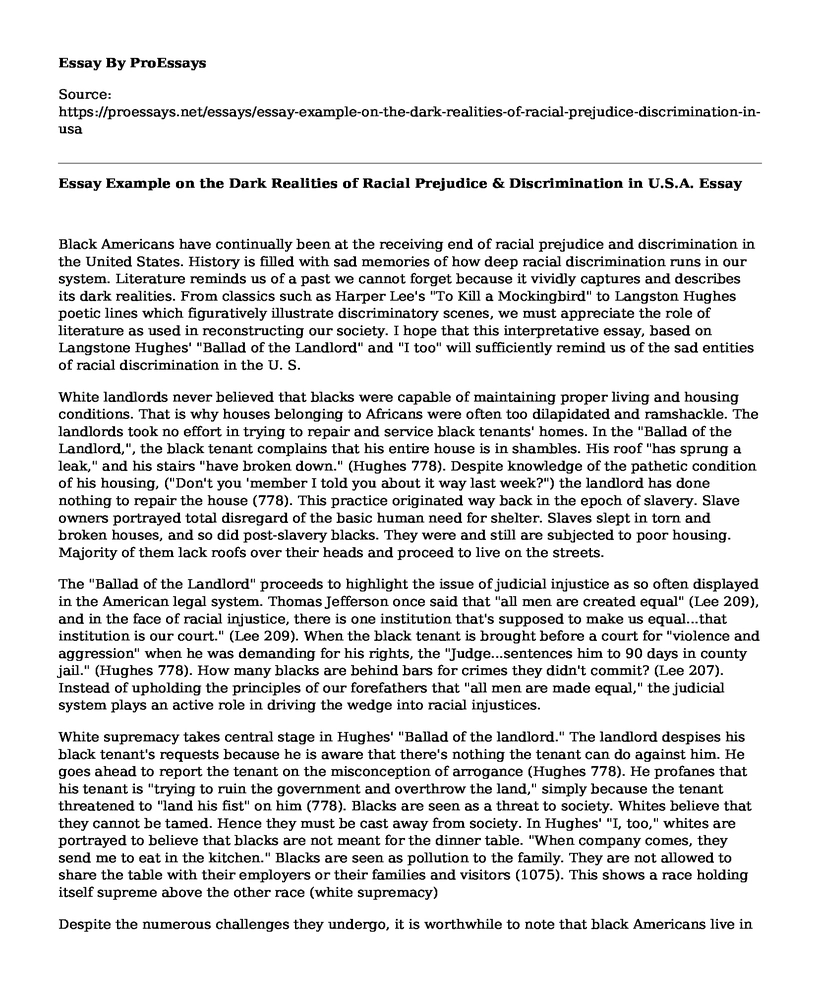Black Americans have continually been at the receiving end of racial prejudice and discrimination in the United States. History is filled with sad memories of how deep racial discrimination runs in our system. Literature reminds us of a past we cannot forget because it vividly captures and describes its dark realities. From classics such as Harper Lee's "To Kill a Mockingbird" to Langston Hughes poetic lines which figuratively illustrate discriminatory scenes, we must appreciate the role of literature as used in reconstructing our society. I hope that this interpretative essay, based on Langstone Hughes' "Ballad of the Landlord" and "I too" will sufficiently remind us of the sad entities of racial discrimination in the U. S.
White landlords never believed that blacks were capable of maintaining proper living and housing conditions. That is why houses belonging to Africans were often too dilapidated and ramshackle. The landlords took no effort in trying to repair and service black tenants' homes. In the "Ballad of the Landlord,", the black tenant complains that his entire house is in shambles. His roof "has sprung a leak," and his stairs "have broken down." (Hughes 778). Despite knowledge of the pathetic condition of his housing, ("Don't you 'member I told you about it way last week?") the landlord has done nothing to repair the house (778). This practice originated way back in the epoch of slavery. Slave owners portrayed total disregard of the basic human need for shelter. Slaves slept in torn and broken houses, and so did post-slavery blacks. They were and still are subjected to poor housing. Majority of them lack roofs over their heads and proceed to live on the streets.
The "Ballad of the Landlord" proceeds to highlight the issue of judicial injustice as so often displayed in the American legal system. Thomas Jefferson once said that "all men are created equal" (Lee 209), and in the face of racial injustice, there is one institution that's supposed to make us equal...that institution is our court." (Lee 209). When the black tenant is brought before a court for "violence and aggression" when he was demanding for his rights, the "Judge...sentences him to 90 days in county jail." (Hughes 778). How many blacks are behind bars for crimes they didn't commit? (Lee 207). Instead of upholding the principles of our forefathers that "all men are made equal," the judicial system plays an active role in driving the wedge into racial injustices.
White supremacy takes central stage in Hughes' "Ballad of the landlord." The landlord despises his black tenant's requests because he is aware that there's nothing the tenant can do against him. He goes ahead to report the tenant on the misconception of arrogance (Hughes 778). He profanes that his tenant is "trying to ruin the government and overthrow the land," simply because the tenant threatened to "land his fist" on him (778). Blacks are seen as a threat to society. Whites believe that they cannot be tamed. Hence they must be cast away from society. In Hughes' "I, too," whites are portrayed to believe that blacks are not meant for the dinner table. "When company comes, they send me to eat in the kitchen." Blacks are seen as pollution to the family. They are not allowed to share the table with their employers or their families and visitors (1075). This shows a race holding itself supreme above the other race (white supremacy)
Despite the numerous challenges they undergo, it is worthwhile to note that black Americans live in the hope that one day all will be well. I "eat well and grow strong..." and when tomorrow dawns, "they'll see how beautiful I am." (1075). This is the hope that all black Americans live in. They know that things will slowly but surely get better, and they will eventually be recognized that they too "are America." Whites should embrace the thought that Africans are beautiful people; the black skin color is beautiful, and that blacks are their counterparts. They are their "darker brothers" who should also be allowed to eat from the table because they too are America, they're part of the family.
Works cited
Lee, H. To Kill a Mockingbird. McIntosh and Otis, Inc. 1960.
Hughes, L. Ballard of the Landlord. Harlem Renaissance.
Hughes, L. I, too, sing America. Harlem Renaissance
Cite this page
Essay Example on the Dark Realities of Racial Prejudice & Discrimination in U.S.A.. (2023, May 08). Retrieved from https://proessays.net/essays/essay-example-on-the-dark-realities-of-racial-prejudice-discrimination-in-usa
If you are the original author of this essay and no longer wish to have it published on the ProEssays website, please click below to request its removal:
- Essay Sample on Domestic Terrorism Currently Threatening the US
- Wage Discrimination and the Residual Approach Paper Example
- Paper Example on HUMINT: A Critical Force for National Security and Intelligence
- Paper Example on Discrimination Against Older Adults: Examining Ageism in Society
- Essay Example on Chemical Threats in Dallas Texas: 34% Refineries in Noncompliance
- Black Men and Public Space - Article Analysis Essay
- Popular Sovereignty: The Texas Revolution and Its Voters - Free Essay







